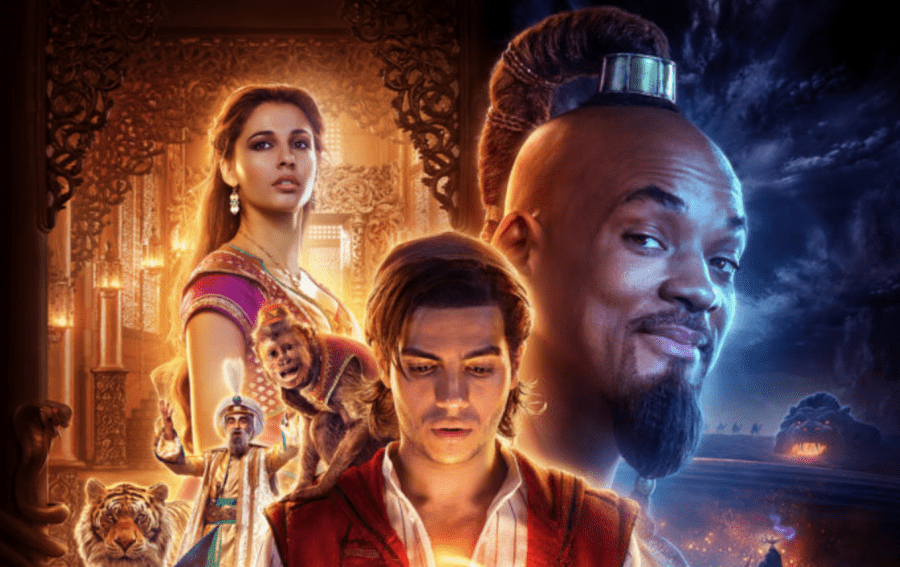Photo from IMBd.
Disney’s theatrical releases dominated the 2019 box office and two of their biggest earners were the live-action remakes of the ’90s animated films “Aladdin” and “The Lion King.”
I loved the “Aladdin” remake and getting to see the fictional city of Agrabah come to life. I enjoyed seeing how the actors made their own as well as the changes in the script and soundtrack that gave Princess Jasmine a stronger voice and character arc.
Going into the “The Lion King,” I was
Visually, I thought the film was stunning, but I felt as though a lot of the emotions were being taken out. I couldn’t help but be disappointed that the emotions in JD McCrary’s voice as Young Simba tried to wake up his dead father didn’t match what I was seeing on the screen. I found myself being bored in scenes and wishing Disney had just left the original alone.
Sophomore Diana Cajouleg described “Aladdin” as “pretty good,” but had issues with “The Lion King.” The realistic animation made it harder for many viewers to empathize with the characters they grew up with.
Junior Makensie Nemes loved “Aladdin,” but refused to even watch “The Lion King” because of the film’s photorealism.
“The definition of a live action movie is living people. They just reanimated an already animated film cartoon,” she said.
Nemes is a self-proclaimed “Disney Kid” with a tattoo inspired by “Peter Pan” on her arm and is looking forward to the upcoming live-action remakes that have been causing a lot of controversy, “The Little Mermaid” and “Mulan.”
In July 2019, Disney announced that the starring role of Ariel in “The Little Mermaid” would be played by young black actress and singer, Halle Bailey. Many people on social media expressed their happiness in seeing more diversity, representation and color-blind casting being reflected. Others were outraged that Ariel would no longer be the white, red-haired mermaid they grew up and loved.
Junior Annie Ell was not one of those outraged fans on social media, but she did understand where they were coming from.
“The imagery that goes along with remaking the original should match up because I think that’s what most of us are looking for in a remake,” she explained.
While Ell is excited to see the film, which will begin production next year, she “would have preferred to see something that was more similar to the original.”
On the other hand, Cajouleg doesn’t understand why Bailey’s ethnicity is such a “big deal” when it comes to this casting.
“The character is a mermaid so it doesn’t need to be white,” Cajouleg said. “As long as she has the skill set for it, I think it will be good. That’s what it should be based on.”
While people have been attacking Disney for not being authentic enough with Ariel, Disney has also received hate for being too authentic in a different manner with their upcoming March 2020 remake of “Mulan.”
The film will have none of the classic songs and will no longer feature the characters Mushu and General Li Shang, Mulan’s love interest. Shang will be replaced by the new characters Commander Tung and Chen Honghui, a recruit along with Mulan who will become her ally and love interest.
These changes are being explained as attempts to be more authentic to Chinese culture, particularly after the film was not well-received in China with its original 1998 release.
Nemes is looking forward to the remake’s changes and wishes that Disney would go even farther by having the characters speak in their native language, as the film does take place in China, with English subtitles for those who need them.
She also recognizes Chinese star Liu Yifei in the title role and is glad that Disney didn’t “whitewash” the character, who was originally voiced by Chinese-American actress Ming-Na Wen.
Ell felt a bit disappointed with the changes, as she did with “The Little Mermaid,” but thinks that the remake will be good in its own ways, but doesn’t think it’s right to call it a remake.
“I think that if you’re going to make a remake, it should be a remake,” she said. “You can’t really call it what it’s not.”
While these four films have received a lot of attention and mixed opinions, Disney’s theatrical live-action remakes are here to stay and have been around for years with films like 1996’s “101 Dalmations” starring Glenn Close as Cruella de Vil. The white-haired, dog-hating villain will be back in theatres again in 2021 in a new live-action remake called “Cruella” starring Emma Stone.
Ell calls these films a “great business idea” and believes that good ideas don’t have to be original like some, such as Cajouleg, may claim. Disney knows that a lot of the power of their so-called “Disney magic” comes from nostalgia of people who grew up watching their films.
“I think they’re trying to bring the same feeling that I had as a kid to kids that are five or six now,” Nemes said.
With the box office numbers Disney’s latest theatrical releases have been having, it seems to be working as well.

